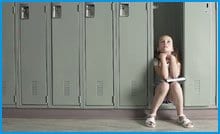Queer parents who want to work to make schools safe for their kids now have a group to help them focus their efforts. The Schools Project, a spin-off of the Queer Parenting Exchange, is a new working group for education advocacy to try to keep queer kids and kids of queer parents from getting lost in the shuffle.
“The biggest concern of LGBTQ [lesbian, gay, bisexual, trans, queer] parents across the board is what happens with their kids in school,” says Rachel Epstein, coordinator of the LGBTQ Parenting Network. “Our kids every day walk into really profoundly heterosexist institutions and they don’t see their families reflected in pictures or the curriculum. Teachers are just not aware of the diversity that exists among families.”
“This project is set to explore the needs of LGBTQ parents and teachers in the system to address issues of inequality and some of the root causes of the barriers that queer kids and even queer teachers face, as well as barriers to queer parents getting involved and making sure their kids are getting a fair education in the system,” says Chris Veldhoven, coordinator of the Queer Parenting programs at the 519 Community Centre.
One of the first things the Schools Project is doing is to plan a day of action around Family Day, the new statutory holiday created by Ontario’s Liberal government, which will fall this year on Mon, Feb 18, 2008. Details for the day of action will be the subject of the group’s next meeting on Wed, Nov 21.
“The Schools Project is in the early stages and we are inviting people to come out who have energy and ideas,” says Epstein.
Queer parents aren’t the only ones who are taking action to improve schools for queer kids.
“We realize that there is still a lot of homophobia that students in schools face, that’s why Egale has launched our Safe Schools Campaign,” says Egale Canada executive director Helen Kennedy, who attended the first Schools Project meeting. “It is a national campaign and we are looking to have gay-straight alliances in every school.
“This year our board highlighted education as a priority and we are addressing it from a number of areas,” says Kennedy. “We just finished an analysis of school board policies across the country and we are reviewing the information which we will release in the new year. Next month we are launching a survey in British Columbia, Ontario and Nova Scotia asking students if and when they experience homophobia and if they feel safe. Eventually we hope to get it to student agencies across the country.”
Kennedy says Egale’s strategy for improving the education system for queer kids is to start with changes in education for teachers.
“Currently LGBTQ issues are not mandatory in teacher’s training,” says Kennedy. “Teachers are starting off in schools and they don’t have the resources to deal with bullying or the training for dealing with same-sex parents.
Kennedy says she recently met with the Ontario College of Teachers to talk about the need for training around queer issues.
“We are working together to develop a new course called the Inclusive Classroom and looking to work with the ministry also on how we can require the training for teachers,” she says.
According to Epstein training is not the only problem. “With the school funding formula we have recently teachers are being so pressured that they don’t have time to deal with equity issues.”
Recently reelected minister of education Kathleen Wynne, the only out lesbian in the provincial parliament, says she’s well aware that homophobia is an issue in Ontario’s school system.
“We are having a discussion right now within the ministry about equity issues in general,” says Wynne. “I believe that these issues cross all the curriculum boundaries and it’s the responsibility of everyone to make sure the message of tolerance and equity gets out. There’s more work to be done which is why I am having a conversation with ministry officials.”
Wynne says she believes the children of queer parents may have it easier in Toronto than in other parts of the province.
“I think our schools are very reflective of our society, whether we’re talking about physical or emotional safety. Depending on where they [kids] are going to school there is going to be a different atmosphere. I think because there is so much diversity in Toronto we sometimes lose sight of the fact that people who live in smaller more homogeneous places have a different experience.”
Although she didn’t offer tangible initiatives to improve the situation at least the goals Wynne sets out are in line with what the Schools Project is looking to achieve.
“Kids can’t achieve when they feel anxious,” says Wynne. “My dream would be that every child feels safe in any school in Ontario; That all our children feel safe and free to be open and honest about who they are. That’s my goal.”
“We want to make schools more welcoming and accessible places for our kids,” says Epstein, “to make it easier for our kids to exist as all of who they are when they go to school.”

 Why you can trust Xtra
Why you can trust Xtra


